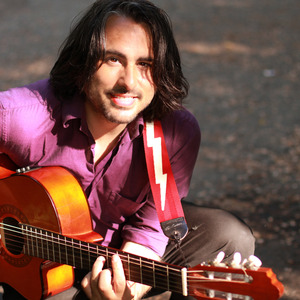

About
Zemog EL Gallo Bueno is a New York City based group of musician friends created and led by Puerto Rican/Peruvian composer and multiinstrumentalist Abraham Gomez-Delgado. Zemog is a 2015 international mutation that plays 21st century Latin music adventuring through 1930's Puerto Rican street cries, 60's free jazz fumes, Chachapoya blood, ...
Contact
No Man is a Salsa Band: The Return of Zemog el Gallo Bueno and the Epic Dance of Identity
Deep in the shadowy valley of depression, in the throes of a medicated flatness, musician Abraham Gomez-Delgado began to have a hard time with the company of other humans. He did his job as a professor, came home, and closed himself off in his room to play his one-man salsa band instrument, which he created, called Eje.
This proved a major problem: the Puerto Rican-born Gomez-Delgado was a bandleader, the driving force behind the funky avant-Latin explorations of Zemog el Gallo Bueno, which has been a part of his former life for over a decade. He thrived when he had a large ensemble which was his means of serious personal and communal expression. He lost his connection to all that.
Things began to fall apart when Gomez-Delgado returned from an intense, joyful summer’s work toward his MFA in Sound Art at Bard College. His Bronx apartment had no heat, and as autumn returned, the musician felt the gloom and school debts piling up. It soon took over his life. He sought help, but the medications prescribed plunged him into a deadened stasis. A land of isolation. He came home and played the Eje, an intricate set-up that allowed him to replicate the multilayered rhythms and intertwining melodies of Afro-Latin music as a single player.
What started out as a last refuge in a dark time, transformed into the path that led Gomez forward. That intensely human journey, one that brushes up against the struggles of a single psyche and of entire peoples, unfolds as a triptych on YouYouMeTú.
Volume 1 presents an entire album of Zemog goodness Gomez-Delgado lost to the vagaries of a hard drive but revived, just as he revived his band. Volume 2 (release: November 13, 2015) chronicles his slow ascent from desolation to connection, with nuanced contemplation of what it means to lose or gain a self, in artistic, political, and powerfully rhythmic terms. (Volume 3, a multimedia opera devoted to the secret history of the eje, is in the works.)
“My heart and soul was blocked and I didn’t realize it,” explains Gomez-Delgado.
Thanks to a new relationship with his now fiancé and partner, jewelry designer and writer, Olia Toporovsky, who saw that he needed to step away from the prescriptions that muted his spirit. These careful changes allowed him to move from the Eje back to his original love: the living, breathing, grooving, improvising, interacting human band that dominates the wild ride of Vol 2.
“There was a flood of my senses reopening, once that block fell away. I felt what was going on in the world and this country. My feelings came back with a vengeance.” The intensity, however, never loses its playfulness, humor and its ability to play with genre and celebrate the beat.
{full story below}
Gomez-Delgado turned to the Eje, with its curling cords and foot pedal drums, an instrument he had developed at Bard. It allowed a new way to hear and feel the music he had long loved, the salsa and plena and cumbia that he had morphed into wigged-out avant-dance music with Zemog. “Learning how to play it forced me to understand exactly how one rhythm relates to another and to my body. I wanted to know: Is it even possible to play group music, something like salsa, as a single musician?” asks Gomez-Delgado. “Each rhythm is a different conversation. A fingerprint of our ancestors. My experience of the Eje forced me to experience just that.” These conversations with himself, along with finding his love and new treatment that eschewed medications, brought him back to his passion for Zemog.
Gomez-Delgado eventually decided to take his Eje out to the world. It shifted the balance. “After one Eje show, I felt an incredible sense of extreme loneliness that felt like I wasn’t just personally lonely but I had ‘somehow broken the laws of nature’ loneliness. I went home and started writing new material for a band at once. Some pieces have morphed over time, especially lyrically, but some, like “(Un Poncho Para Los Dos) A Poncho for 2,” were spot on.” On “Poncho,” Gomez-Delgado sings metaphorically, to a swaying, heart-wrenching beat, of the pills lost in a fog of cotton, looking for his tribe. It was his own loss.
Yet most of Zemog’s trip is about gain, return, renaissance, despite every doubt and challenge. Gomez-Delgado rescued Vol 1 from digital oblivion, and restored his own spirit with the help of his life partner, Olia.
“I’ve been a bandleader since I was nine. I got the rehearsals going in my house for my first band, The Chimpanzees, with friends. I love it: I get to put all these different musicians and people together,” reflects Gomez-Delgado. “It’s so much fun to play; it’s like a ritual for me that I imagine stretching back to Puerto Rico, back to West Africa. Playing this music means having a real-time conversation with everyone who is present.”
It is also a way to have a profound conversation with his forebearers and the future: Tracks like “Calma Tus Colores” and “Hipnotico” scintillate between the past and the fantastic fiction to come. And by grappling with his own self and its trials, Gomez-Delgado found increasing clarity about the context and lineage he draws on, the nastiness of discrimination and exile, the real need for justice and community.
“When I was wrongly medicated, I questioned everything. I thought, ‘I was insane and didn’t know it!’” he recalls. “Zemog, the Eje, it was all crazy. When I finally got off meds, I knew Zemog was not crazy. Or maybe it still is, but I don’t care. There’s deep racism in our world, there are all these vital issues, and we need to keep fighting for human justice. Once I was doing better, I started mentoring young men who just got out of jail, helping them stay out. I learned a lot from them and I am grateful for that. Everything came back, and stronger.” That power pulses throughYouYouMeTú.






